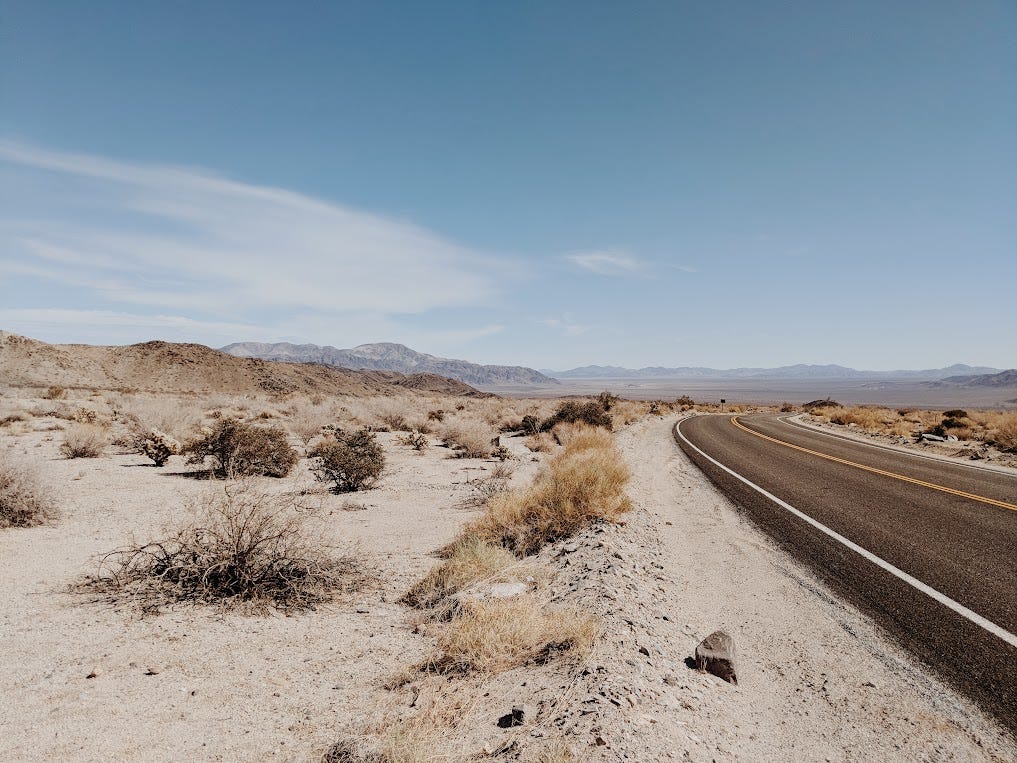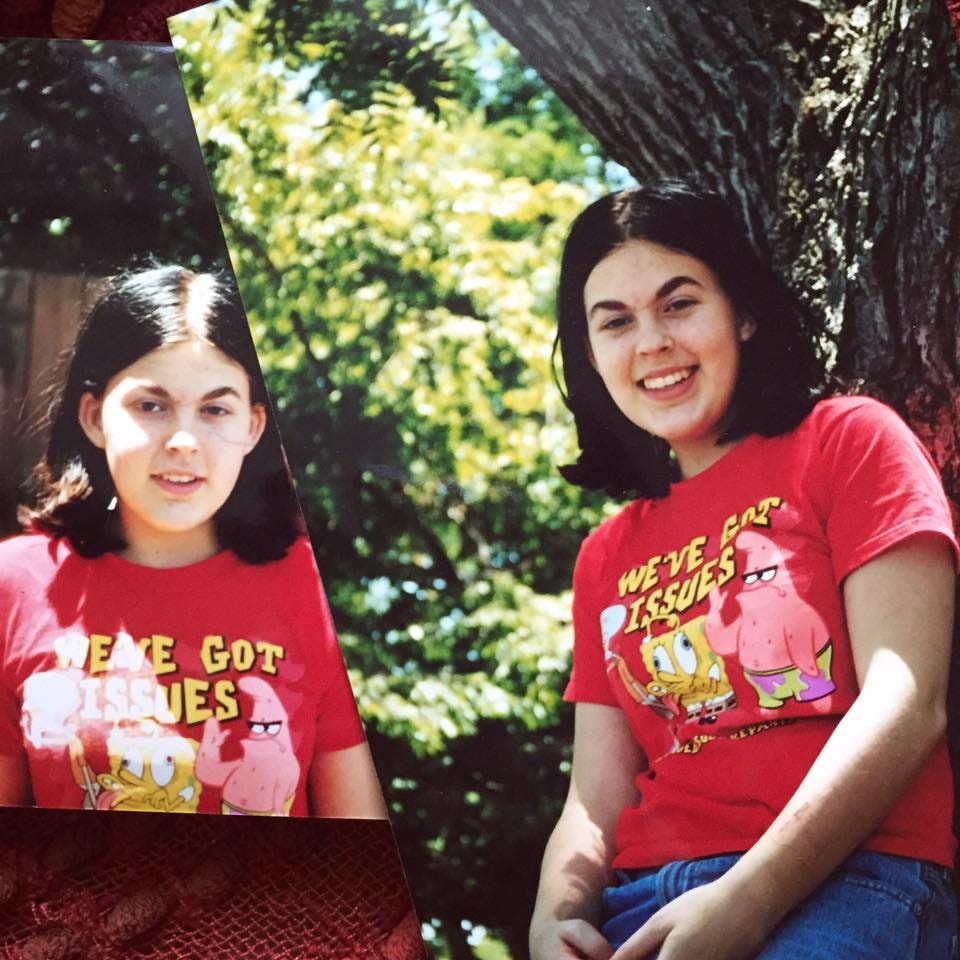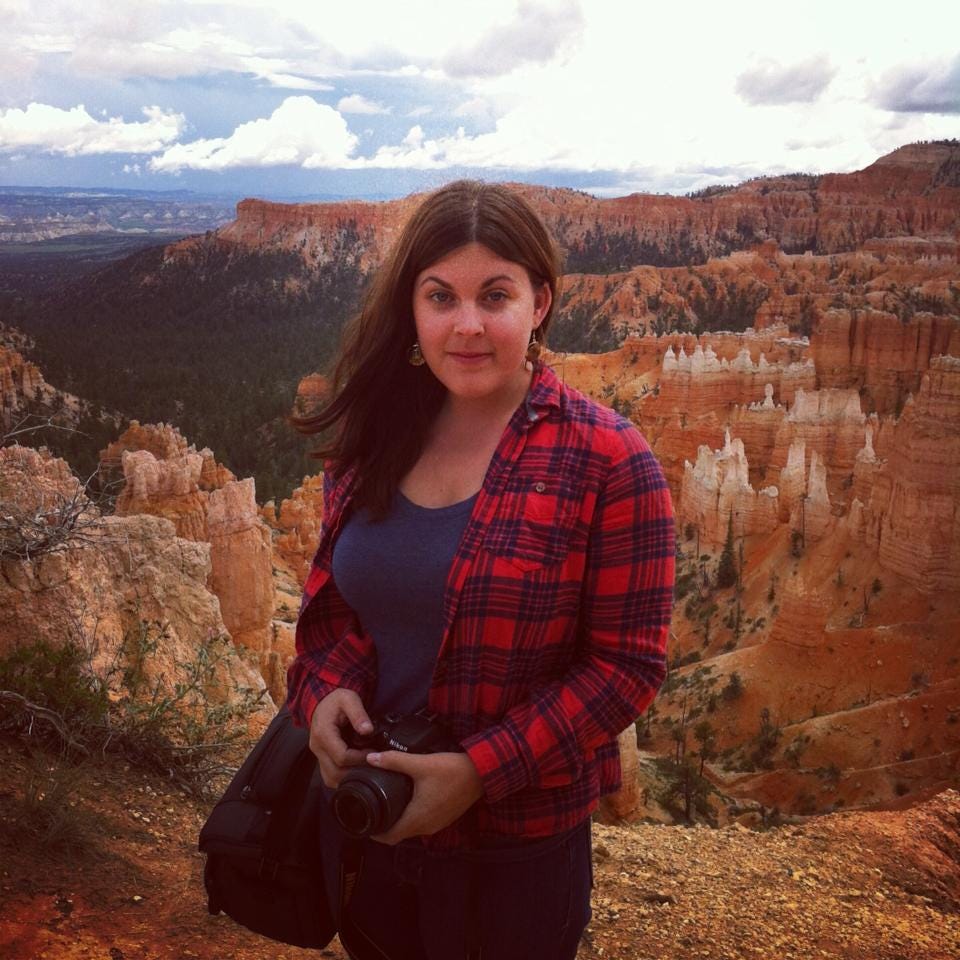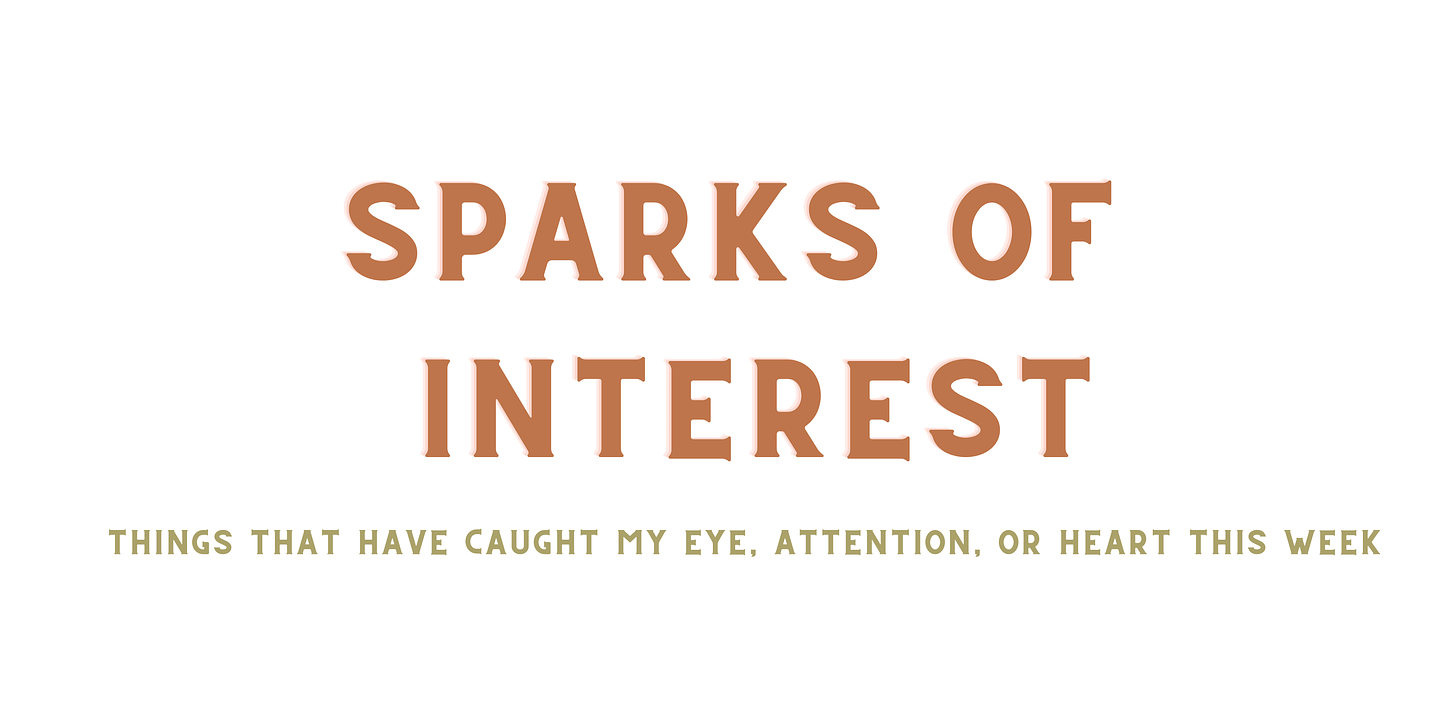Human Stuff is a free weekly newsletter. If you’d like to support my work and also access my monthly reflection guide, I invite you to become a paid subscriber. This is a reader-supported offering and I’m so grateful for your presence here.
Please feel free to share parts of this newsletter that connect with you on social media or send to someone you love.
A song I’m loving:
Content warning: This letter contains mentions of suicidality. Please take care of yourself and skip this week’s share if needed.
Every Sunday morning at around 6:30am, my husband takes my daughter from our bed, where we’ve all been reading and cuddling since wakeup time, and they move to the living room while I remain in bed and write (or finish writing) my newsletter. I don’t always know what I’m going to write about until I start typing — I try to just listen to what’s true and let it be enough (I’m going for devotion to writing practice here -- not a perfect, life-changing essay every single week) — and for some reason, this morning, what came to me was something I don’t share much about but will be sharing about today. It’s more vulnerable than I am used to sharing here, so your energetic care even before proceeding is appreciated.
Next month, it will have been 21 years since I tried to end my life. I think back to that period of time — to sitting on the vinyl floor, both wanting it to end and being afraid of it ending. I think back to sitting on the rickety bed at the psychiatric hospital in Vallejo, the wire frame of the cheap mattress poking under my thighs, to the bland sandwiches we ate, to the notes passed back and forth between myself and other teens who were fighting for their own lives in some way, eating tasteless meals alongside me, wondering what it would be like to emerge alive again. I think back to the various hospital visits that followed: to the longer stay at a residential center in San Jose; the unit in Fremont; a second visit to Vallejo; a visit in Santa Cruz; I think back to the lies I told when I returned from missing weeks of school, to constantly wearing long sleeves that covered the red dashes, to changing schools entirely in my junior year to avoid the questions. I think back to wondering if I’d ever stop bopping in and out of those places that became placeholders between not wanting to live and somehow finding the will again.
There have been many instances of coming close to the edge since — how easy it is for someone with my brain and history to find myself there, maybe not dangling over like I have before but leaning right by the (metaphorical) drop-off, moving my feet closer to the cliff, peering down and watching the rocks tumble below while I questioned if I’d tumble with them. And I always kept going. I always keep going.
It’s been a tougher season of life the past few years, for a variety of reasons I’m sure many of you can relate to in some ways. I’ve lost and found and lost myself, over and over again. Whenever I move through a harder period, or find myself located in the center of a more tender season, I get afraid I’ll fall back there, to that unknowable place I sadly got to know quite well. Some part of me fears I won’t be able to keep going like I always have — that I’ll find too much familiarity in the now-distant feeling of not wanting to be here — that I’ll find myself back on a rickety hospital bed, eating the bland sandwich, wanting it to end. Those years of life feel both so far away and so intimately close; the nuance and difference between struggling with life and not wanting to live is desperately important for someone who has been on the edge before.
It took a long time to separate depression from not wanting to live — to separate a season of grief from a signal that something is terribly wrong — to separate being lost from being without will to keep going. It took years of inner exploration to know myself well enough to be with my depression without letting it fully have its way with me — to carry it, rather than be carried by it.
It took the consistency offered to me through working at Trader Joe’s for 10.5 years, learning to stay. It took ongoing therapy and continued support, learning to stay. It took creative expression, learning to stay. It took the ups and downs of my (on and off in the early stages) 13+ year partnership, learning to stay. It took confronting the truth, learning to stay. It took moving through community college, then undergraduate, then graduate school, learning to stay. It took committing to a book, learning to stay. It took going on trips alone, learning to stay. It took existing outside of my roles, learning to stay. It took discovery and finding new pieces of myself, learning to stay.
It took the continual repeated act of staying, right in the discomfort, even when fleeing or pushing away felt more familiar at times, to find solid ground in the pain, let alone find my way around and through it over and over again.
Learning to stay has followed me through different territories. My devotion to consistency isn’t always about falling into the busyness trap, or feeling pressure to do more than I desire to do, or fear of not keeping up. Sometimes, consistency is a tracker of my aliveness, of consciously staying. Consistency is a signal I’m present, in momentum, with drive, with staying power, with care of self that lacked for far too long. When I make my tinctures in the afternoons, I’m caring for myself. When I show up to write this newsletter every single week for the practice of writing when I could do it less, or do it more perfectly even less than that, I’m caring for myself. When I send the text. When I go for the walk. When I write the book, and book the trip, and do the yoga practice, and drink the water, and go to bed before 10pm, I’m caring for myself. And in doing so consistently, for my physical, emotional, creative, relational, and spiritual self, I stay closer to aliveness. For me — for my history and story and tendencies — that is everything.
What I once longed for more than anything was a change drastic enough to signal to myself I’d never again return to the inner landscape of not wanting to be here. Luckily, it’s been a long time since I’ve been in those places. I’m hopeful I won’t find myself there again, in those depths only some of us know closely. Yet I feel less desperate to know for sure, and more available to just trusting what I’ve gleaned — trusting what I’ve taken with me from the cliff’s edges — trusting it’s enough to keep me going.
When I think about how I wish I could go back to my teenage self and swoop her up, swing her around in the air until she felt the wind rustling her hair and remembered how good it was to be alive, tell her how much she’d go on to do even with seasons of depression, what I really mean is that I need to swoop my current self up, maybe run around in the backyard for a few moments underneath the rain, looking up to let it splatter my cheeks, until I absorb how good it is to be alive — in the midst of the hard, in the middle of the tougher season, in the thick of the grief, in the swelter of the unknown — even here. My gut knows it to be true, even when my brain wants to forget. And I think that’s what I’ve learned to do — orient toward my gut’s knowing when my brain doesn’t feel so reliable, rather than berate my brain for struggling and not giving myself any other through-lines to the knowing that hides behind the cloud.
Depression continues to be a companion — one I’ve learned may be here to stay in some form —a reckoning no mushroom or meditation or mindset can remove in its entirety. It may forever be a cliff I edge toward and step away from, depending on the season I’m in. What has helped even more than ridding myself of it is getting rid of the incessant search for what will fix it, cure it, disappear it. More than not having it at all, what has been most nourishing and what has given me my life back is a deep acceptance that it is here —and now what? Aliveness comes from getting to choose my answer. Aliveness comes from remembering the choice is here to begin with.
The song I shared today ( at the top of this letter) is called A Tiny Ripple That Becomes A Giant Wave. It sounds the way it feels to live fully even with depression — heartbreaking and stunning, subtle and poignant, quietly powerful, transcendent and present. I trust the tiny ripples. I let them become giant waves. I trust the tiny moves. I let them become big strides. I trust the tiny acts of care. I let them become a whole parade of nourishment. I trust the tiny moments of momentum. I let them become an entire world — an entire life.
— and PS. because I know some will wonder or maybe even have the guts to ask… yes, I’m okay. No, I’m not in that place again. The gift of being alive is getting to reflect honestly about some of the edges many of us walk up against from time to time, without turning away or giving it a happy ending or morphing myself into a Before and After story. I am just a human, in the middle of living a life, gleaning what I can from it — just like you. Thank you for witnessing. May you give yourself the gift of your own aliveness. May you allow all the facets of being here to be held, to be seen, to be heard and tended to, as if all of it belongs.
△ I appreciated this piece from CRAFT TALK so much
△ I don’t have TikTok but I’m fascinated with BookTok
△ Seeing My Body With Fresh Eyes
△ The Puzzling Gap Between How Old You Are and How Old You Think You Are
△ To Be Made Whole -- this conversation stunned me
△ The Pandemic Forever Changed How We Think About the Future
△ My biggest source of comfort food: soup. I make this simple/classic recipe a lot, adding tons of lemon, dill, and parsley. It’s perfect.
△ George Saunders on rejection
With care,
Lisa









Your words resonate deeply. Especially the part about not trying to figure out what will make depression end. Sometimes is just about remembering that tomorrow might be better somehow and to keep going. Thank you for sharing your story, it makes me feel more understood.
Commitment to consistency--not in a grind culture kind of way but as a way of being present to your life--is a beautiful intention, one that feels resonant and accessible. Thank you for showing up here, in your full humanity, every week. I saved these true, supportive lines to my Notes app:
“how good it is to be alive — in the midst of the hard, in the middle of the tougher season, in the thick of the grief, in the swelter of the unknown — even here”
“orient toward my gut’s knowing when my brain doesn’t feel so reliable, rather than berate my brain for struggling”